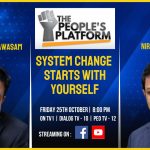
In a recent discussion on the Sri Lankan television channel Sirasa TV, Dr. Gamini Hewawasam shared compelling insights into how mindfulness can transform leadership and drive system change in Sri Lanka. This conversation highlighted the practical benefits of mindfulness, delving into its significant role in enhancing leadership capabilities, fostering educational growth, and promoting broader societal development.
Dr. Hewawasam initiated the discussion by emphasizing that mindfulness, which is the seventh step of the Supernormal Eightfold Way, is a framework well-known among Sri Lankans. He posed a critical question: Why have many Sri Lankans not fully harnessed the potential of the mindfulness practices available to them? Drawing on his studies in global leadership in the USA, Dr. Hewawasam observed that, despite the broad awareness of mindfulness within Sri Lanka, its practical benefits have yet to be fully realized. This insight led him to establish the ManoLead Research Center, where he conducts action research on introspective leadership, with the aim of uncovering how mindfulness can enhance decision-making for leaders.
One of the focal points of the discussion was the “Team of Teams” approach, which Dr. Hewawasam suggested Sri Lanka should adopt. Originally popularized by retired US Army General Stanley McChrystal in his book Team of Teams: New Rules of Engagement for a Complex World, this concept emphasizes building networks of smaller, cohesive teams that work together to solve complex problems. Dr. Hewawasam believes that by adopting this method, Sri Lanka can not only strengthen its leadership structures but also create a more effective opposition that works in collaboration with the government for the greater good.
Another significant theme that emerged was the need to unlearn outdated practices. Dr. Hewawasam stressed the importance of teaching children to “do good” instead of merely focusing on “be good.” He explained that, too often, people are taught to act in ways that appear good, without developing a deeper understanding of morality. He emphasized that real development must begin with self-reflection and personal accountability. This approach encourages individuals to take responsibility for their own actions as a foundation for broader societal transformation.
In his final remarks, Dr. Hewawasam emphasized that Sri Lanka has immense potential for growth and development if leadership skills are cultivated through the practice of mindfulness techniques. He believes that the future of the country rests in nurturing future generations by teaching them to unlearn ineffective habits, to “do good” instead of simply “be good,” and to operate with integrity and accountability. With proper guidance, he highlighted, we can work towards eradicating fraud and corruption in both government and society as a whole.
Click here to watch the full video on YouTube.


